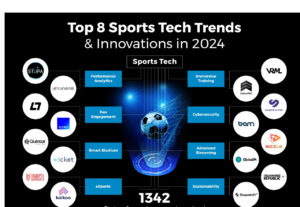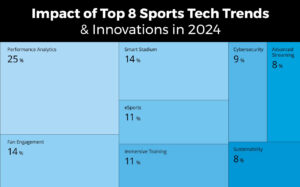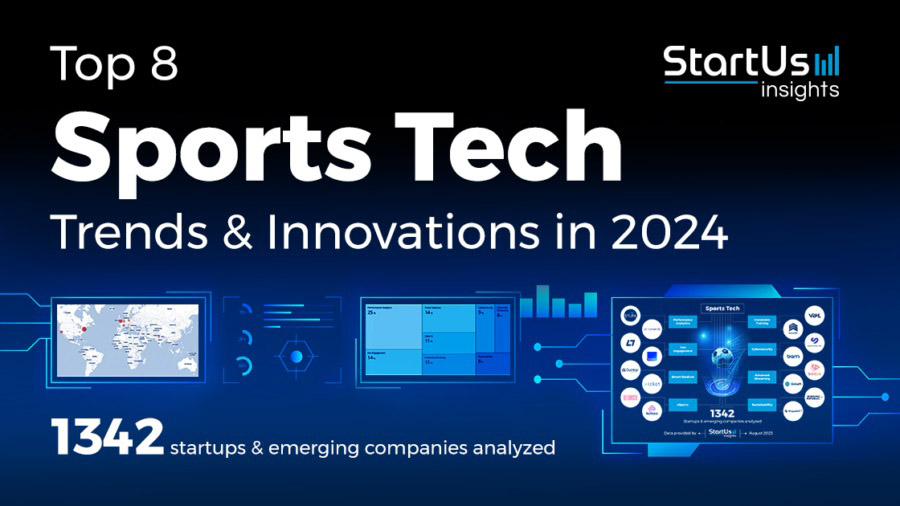Sports Industry Trends:
Sports industry trends have traditionally held a prominent place in our entertainment landscape, with the sector expanding at a remarkable rate. To address the requirements of athletes and supporters, sports technologies are progressing swiftly and transforming the sports industry. Technological innovations are impacting the training methods of athletes, the management of sports facilities, and the communication strategies of sports teams.
The latest trends and advancements in the sports industry trends encompass utilizing AI and Big Data for performance analytics, implementing IoT technologies, conducting crowd sentiment analysis, and introducing contactless solutions for smart stadiums, eSports, and cyber security. Moreover, immersive reality solutions such as AR/VR and holograms are enhancing training methods and increasing fan engagement.
Innovation Map outlines the Top 8 Sports Industry Trends & 16 Promising Startups
Our thorough investigation into the Top Tech Sports Industry Trends & Startups involved the analysis of a sample of 1342 global startups & scaleups. This research, driven by data, offers valuable innovation insights to enhance your strategic decision-making process by presenting a snapshot of the latest technologies in the sports tech sector. The Sports Industry Trends Tech Innovation Map provides a detailed summary of the innovation trends & startups that are influencing your business.
Top 8 Sports Industry Trends in 2024
- Performance Analytics
- Fan Engagement
- Smart Stadium
- eSports
- Immersive Training
- Cyber security
- Advanced Streaming
- Sustainability

Our extensive knowledge is obtained through the utilization of our Big Data & Artificial Intelligence-driven startups Insights Discovery Platform, which encompasses over 3,790,000 startups & scaleups worldwide. As the leading source of information on up-and-coming businesses, our SaaS platform allows for rapid and comprehensive identification of pertinent technologies and industry trends.
Tree Map reveals the Impact of the Top 8 Sport Trends in 2024
The Tree Map presented in the Innovation Map showcases the latest trends in the sports industry trends for 2024. Startups are actively working on developing technologies to enhance fan engagement, boost athletes’ performance, and elevate the overall experience of sports events. These efforts are aimed at enhancing the quality of games, streamlining match preparation processes, and ensuring the stability and transparency of sports organizations’ activities.
An up-and-coming development in sports industry trends technology involves the ongoing monitoring of athletic performance. Through the use of artificial intelligence and wearable’s, in-depth information about athletes is gathered to anticipate potential risks. Furthermore, fan engagement serves to improve the interaction between sports teams and their supporters.
Startups are developing innovative solutions for smart stadiums to enhance the experience of both fans and teams at the venue, all while prioritizing their safety. In addition, eSports startups are integrating computer vision, machine learning (ML), and immersive gaming to elevate the overall quality of online gaming. Furthermore, immersive training is enhancing athletes’ match preparation and enabling them to simulate the game. Lastly, cyber security solutions are safeguarding gamers’ and fans’ data, which is often targeted by cybercriminals.
Cutting-edge streaming services are revolutionizing conventional broadcasting through the utilization of 5G networks and virtual reality (VR) technologies, enabling viewers to experience live stadium events from the comfort of their own homes. Additionally, in an effort to minimize carbon emissions and lessen environmental harm, the sector is actively creating and integrating sustainable advancements.

Top 8 Sports Industry Trends for 2024
1. Performance Analytics
Coaches and athletes aim to comprehend the key factors that contribute to success in a game in order to boost performance and make better decisions. Performance analytics tools are utilized to assess a wide array of data, pinpointing areas that require enhancement in sports strategy development. Video and motion analytics offer insights into various aspects including ball position, player movement and participation, timing of specific actions, and the resulting outcomes.
Wearable devices like data-tracking wristbands, sensors embedded in equipment, and smart clothing provide accurate data on athletes’ movements, strength, and precision, while also predicting potential injury risks. This allows for informed decision-making both prior to and during sporting events.
Stupa Analytics offers Table Tennis Performance Analytics
Stupa Analytics, a startup based in India, delivers real-time performance analysis for table tennis matches and practice sessions. Through its AI-powered app, the company analyzes match recordings to produce reports on game patterns, shot placement, and consistency. This capability enables coaches to compare performance statistics over time and enhance athlete development strategies.
Runeasi enables Gait Analysis
Runeasi, a sports analytics startup based in Belgium, has developed a cutting-edge smart belt that allows for value-based gait analysis in athletes dealing with musculoskeletal issues. This wearable device utilizes advanced biomechanics technology powered by artificial intelligence to track various metrics such as cumulative impact, peak impact rate, impact context, impact asymmetry, and dynamic stability.
2. Fan Engagement
Supporters play a crucial role in the sports industry trends, offering physical presence at events and purchasing team merchandise. Establishing strong connections with fans is essential to ensure their ongoing loyalty. In order to enhance fan interaction, organizations utilize a range of technologies including blockchain for clear communication and video sharing, biometric identification systems, and AI-driven smart chatbots.
Holographic technology utilized at live events enhances fan engagement by enabling them to interact with their beloved sports stars regardless of their location. Fan participation is equally crucial in the realm of eSports. Startups are innovating sports fan platforms to establish an eSports community, exchange sports highlights, and empower clubs to connect with their fans.
Interacting with fans is a crucial element of eSports. New companies are working on fan platforms for sports to establish an eSports community, exchange sports highlights, and allow teams to engage with their supporters’ viewpoints.
Liquid team provides Digital Collectibles
Liquid Team, a German startup, assists sports clubs in establishing a digital connection with their fans. Through its LT fan platform, fans are given the opportunity to possess digital collectibles of their beloved teams. This solution aims to foster a closer relationship between the international fan base and the club by encouraging engaging and entertaining interactions with the teams.
Supporters have the opportunity to acquire complimentary or sponsored club tokens in order to engage in different voting, ideation missions, or submit proposals to their preferred club.
Scorz offers In-Venue Connectable
Scorz, an Australian startup, specializes in creating reusable in-venue connectable designed to enhance fan engagement. Their innovative solutions not only elevate the overall experience within venues but also enable fans to collectively celebrate the most exciting moments of the game. By programming beer glasses and jars to illuminate in the colors of the supporting teams for every score, Scorz adds an interactive and immersive element to the fan experience.
Following the coronavirus restrictions, the startup created a cup with Bluetooth capability that links to the Scorz App, allowing for the celebration of teams’ scores and enhancing engagement with in-home audiences. Following the coronavirus restrictions, the startup created a cup with Bluetooth capability that links to the Scorz App, allowing for the celebration of teams’ scores and enhancing engagement with in-home audiences.
3. Smart Stadium
Sports industry trends tech startups are incorporating advanced technologies to enhance the fan experience at stadiums, offering additional features for in-venue match enjoyment. AI-based crowd sentiment analysis is utilized to measure the level of enjoyment of attendees by monitoring their emotions during the game. Despite this, many fans are now opting to watch the game on TV, indicating a shift in preferences.
Drones streamline the process of cleaning and delivering snacks to the seats at the stadium. Additionally, the Internet of Things (IoT) enhances the connectivity and bandwidth of the smart stadium, enabling attendees to quickly check in, locate parking spots, and use various apps without any delays.
Quintar provides AR Data Visualization Platform
Quintar, a US-based startup, is dedicated to developing an augmented reality data visualization platform that enhances the gaming experience. This platform showcases various data such as player profiles, game statistics, and the trajectory of the ball’s movement.
Additionally, it allows fans to view the game from different angles, addressing visibility issues that may arise from certain seating areas within the stadium. By providing in-depth analytics in real-time, Quintar significantly elevates the overall fan experience at the stadium.
Wicket, a startup based in the United States, provides crowd management software that utilizes computer vision technology to eliminate long queues at stadiums. This software allows for touchless fan ticketing and entry through facial authentication, while also controlling access to employee-only and sensitive areas.
The innovative crowd counter accurately calculates the number of individuals present at the stadium, while also pinpointing areas of congestion to enhance overall stadium crowd management.
4. ESports
The growth of eSports can be credited to the progress in next-generation technologies in the industry. The rising accessibility of smartphones is removing obstacles to entry in eSports, as seen in the widespread appeal of free-to-play competitive games such as PUBG Mobile.
Innovations like computer vision offer intricate insights into players’ strategies and choices during matches. AI empowers eSports betting platforms to establish more precise odds and boost their earnings, enabling bettors to achieve a higher success rate through comprehensive game data analysis.
Dynasty enables eSports Portal Management
Dynasty, a startup based in Singapore, operates as an eSports portal management (EPM) platform. By merging the gaming and media landscapes, the platform aims to enhance customer satisfaction and engage top-tier players. Unlike its competitors that focus on singular services like game streaming or online marketplaces, this startup offers a comprehensive eSports portal.
The startup also offers opportunities for skill enhancement and player development through AI-driven coaching utilizing gameplay data, outcomes, and game API. Consequently, eSports organizations can efficiently oversee and capitalize on their gaming events and competitions.
Kaikoo provides eSports coaching
Kaikoo, a startup from Spain, has created a comprehensive eSports coaching platform tailored for the widely played game League of Legends. This platform integrates specific tasks that players can complete while actively participating in the game. Through the control panel, gamers can monitor their team’s progress.
Moreover, the platform offers role-specific guides in video format, along with practical tasks to reinforce the knowledge gained from each module. This innovative solution enables eSports enthusiasts to enhance their gaming skills significantly.
5. Immersive Training
In order to enhance the performance of athletes, coaches and athletes are increasingly utilizing immersive training technologies to practice new strategies and prepare for competitions. Virtual reality (VR) enables players to simulate realistic environments, allowing them to train effectively and even recreate live sporting events.
When paired with 3D sensor technology, it offers athletes an authentic experience by incorporating realistic visuals, sounds, tactile sensations, and even scents, replicating the atmosphere of a live stadium. These advancements enhance player coordination and offer valuable insights into trainees’ progress and athletes’ capabilities.
VR Motion Learning offers VR Tennis Training
VR Motion Learning, an Austrian startup, provides a virtual reality tennis training platform. The platform utilizes motion learning technology to give players feedback on their movements, comparing them to those of professional athletes or previous exercises. It also scans and analyzes players’ biomechanical data to determine the most effective movement patterns.
VR Motion Learning, an Austrian startup, provides a virtual reality tennis training platform. The platform utilizes motion learning technology to give players feedback on their movements, comparing them to those of professional athletes or previous exercises. It also scans and analyzes players’ biomechanical data to determine the most effective movement patterns.
Status PRO develops an XR Football Training Platform
Status PRO, a startup headquartered in the United States, specializes in creating an extended reality (XR) football training platform tailored specifically for the NFL. This innovative platform utilizes real-time player data to create holographic experiences, allowing players to simulate various practice and game scenarios without the physical toll of actual gameplay. By simulating practices and game repetitions, the platform aims to enhance team skills and tactics.
6. Cyber security
The growth of the sports industry has led to an increase in the threat of cyber-attacks. Attackers are targeting the data of fans and athletes, streaming platforms, and the significant budgets of major sports events. To mitigate risks and protect assets, sports organizers are focusing on enhancing cyber security measures for both the venue and attendees. This includes the implementation of protective technologies and providing cyber security training for employees.
Furthermore, the use of block chain technology is essential for purchase protection and securing fan data, while email defense systems are deployed to prevent phishing attempts and viruses.
Gamer Safer provides eSports Player Verification
Gamer Safer, a startup based in the US, is creating cross-platform identity management software designed for player verification and authentication. This software utilizes livener’s detection and biometric face-matching technology to provide age verification and parental consent, which are necessary for youth players and female-only leagues, as mandated by regulators.
The solution developed by the startup identifies characters, fraudulent and replicated accounts, toxic behavior, and deceitful actions. This guarantees a favorable eSports gaming environment while also safeguarding the interests of players and sponsors.
B.A.M Ticketing offers NFT Event Ticketing
B.A.M. Ticketing, an Austrian startup, offers an NFT event ticketing solution that effectively eradicates black markets and generates additional revenue through secondary trading. With its block chain technology, the startup can handle over a thousand transactions per second, enabling multiple events to utilize this high processing rate simultaneously.
In addition, whenever an NFT ticket is resold, the issuer earns royalty payments in addition to other stakeholders. NFT Event ticketing disables scalper bots that increase ticket prices, thus offering a fair, transparent, and tamper-proof ticketing solution.
7. Advanced Sports Streaming
The advancement of digitalization has caused a disruption in sports broadcasting. Broadcasters are now aiming to offer a customized experience and in-depth information while ensuring a fast streaming speed. Cutting-edge 3D technologies and 4K resolution are enhancing the quality of streams for fans. OTT platforms are enabling live streaming on internet-connected devices, giving fans the flexibility to watch matches on various devices from any location.
Moreover, VR streaming is an additional technology that offers fans a chance to immerse themselves in the game. This feature allows viewers to switch seats virtually and watch the game from different perspectives. These technological innovations are elevating the broadcasting quality and providing fans with more precise details about the ongoing match.
Sizzle provides AI Broadcast Analysis
Sizzle, a startup based in the US, enhances live streams by utilizing patented, personalized highlights. The company’s AI examines the video, audio, and chats of live streams and autonomously identifies significant moments, such as big plays or moments of excitement from commentators and viewers.
All highlights are linked back to the original video, allowing each fan to access a unique set of highlights, such as funny moments or top offensive plays. This technology is compatible with popular platforms like Twitch or YouTube, eliminating the necessity for extra software installation.
Global M develops a Streaming Platform

Global M, a startup based in Switzerland, improves event coordination with its software-defined video network. The network’s architecture allows for secure and dependable transport (SRT) packet recovery without interfering with the source stream or other streams from rights holders in the network. This capability enables direct streaming to the decoder, bypassing the need for conferencing software and social media apps. Consequently, it simplifies the management of sports events and broadcast applications. By eliminating the reliance on satellite uplinks, Global M’s solution enables quicker sports streaming with lower latency and costs.
8. Sustainability
Startups in the tech sports industry trends are implementing new ideas to reduce their environmental footprint. One such innovation involves recycling leftover food from stadiums after games to prevent food waste from polluting landfills. Additionally, rainwater reuse systems are being utilized to water plants, grass, and for other purposes in and around smart stadiums, helping to decrease greenhouse gas emissions.
During events, stadiums consume large amounts of electricity, leading to a shift towards using renewable energy sources.
The Running Public produces Sustainable Athletic Wear
The Running Public, a Spanish startup, specializes in creating environmentally friendly sports apparel for athletes. By utilizing recycled materials like plastic bottles, fishing nets, and other plastic waste, the company significantly decreases the environmental footprint associated with athletic wear production.
In addition to promoting sustainability, The Running Public also focuses on reducing carbon emissions and steering clear of new oil-based materials, all while delivering durable sports clothing for athletes.
Shape shift 3D designs 3D-printed Sports Equipment
Shape shift 3D, a startup based in Canada, specializes in creating personalized sports and protective gear through its innovative AI software platform. Users simply upload a 3D file, which the platform then scans and modifies as necessary. This platform is accessible on both desktop computers and the cloud, allowing for the additive manufacturing of custom sports equipment such as skates and football helmets. As a result, production costs are minimized, and energy consumption throughout the product’s lifecycle is reduced.
Discover all Sports Trends, Technologies & Startups
Progress in machine learning (ML), artificial intelligence (AI), fantasy sports, virtual reality, robotics, and the Internet of Things (IoT) are set to have a substantial impact on the sports industry. In response to the COVID pandemic, sports tech startups have implemented virtual fan technologies to improve the fan viewing experience. These technologies are anticipated to have an even greater impact in the years after the pandemic. Additionally, live sports competitions, online gaming, and streaming services are progressing quickly. Ensuring the safety of fans and athletes continues to be of utmost importance.
Additionally, startups will prioritize technologies such as biometric authentication, facial recognition, and ransomware prevention to address current and future threats. The sports advancements outlined in this report only scratch the surface of the trends that we identified during our data-driven innovation and startup scouting process. Recognizing new opportunities and emerging technologies to integrate into your business can significantly contribute to gaining a competitive edge..
